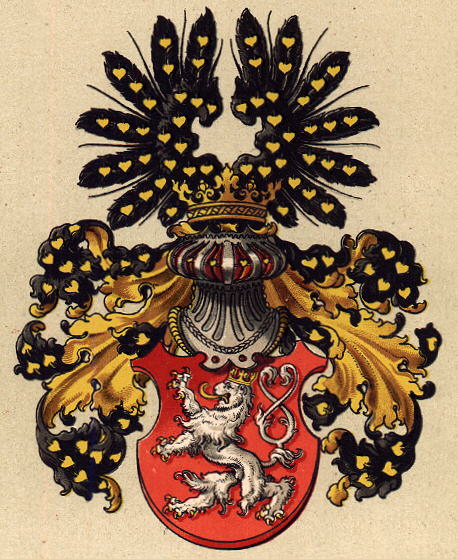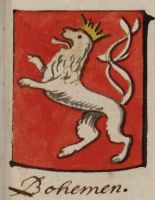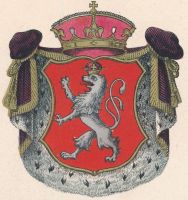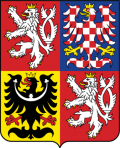Kingdom of Bohemia: Difference between revisions
Knorrepoes (talk | contribs) m (Text replacement - " Wapen- en Vlaggenboek van Gerrit Hesman (1708)" to " Wapen- en Vlaggenboek van Gerrit Hesman (1708)") Tags: Mobile edit Mobile web edit |
Knorrepoes (talk | contribs) m (Text replacement - "===Image Gallery===" to "===Image gallery===") |
||
| (13 intermediate revisions by the same user not shown) | |||
| Line 1: | Line 1: | ||
'''KINGDOM OF BOHEMIA''' | '''KINGDOM OF BOHEMIA''' | ||
| Line 5: | Line 4: | ||
[[File:bohemia.ahe.jpg|center|Arms (crest) of {{PAGENAME}}]] | [[File:bohemia.ahe.jpg|center|Arms (crest) of {{PAGENAME}}]] | ||
= | {| class="wikitable" | ||
|+Official blazon | |||
|- | |||
|'''Czech''' | |||
| blazon wanted | |||
|- | |||
|'''English''' | |||
| blazon wanted | |||
|} | |||
===Origin/meaning=== | ===Origin/meaning=== | ||
Bohemia was a Duchy, which became a Kingdom in 1196. The Kingdom is now mainly in the Czech Republic, but historically also parts of Poland, Italy and Germany belonged to Bohemia. On October 24, 1526, the Dukes of Austria acquired the Kingdom of Bohemia, which remained part of Austria-Hungary until 1919. | Bohemia was a Duchy, which became a Kingdom in 1196. The Kingdom is now mainly in the Czech Republic, but historically also parts of Poland, Italy and Germany belonged to Bohemia. On October 24, 1526, the Dukes of Austria acquired the Kingdom of Bohemia, which remained part of Austria-Hungary until 1919. | ||
| Line 14: | Line 22: | ||
The lion now forms part of the national arms of the [[Czech Republic]], as well as many towns in the Czech Republic (such as [[Becov]], [[Chotebor]], [[Peruc]] and [[Zinkovy]] and Germany (such as [[Dudeldorf]], [[Gräfenberg]] and [[Plech]]). | The lion now forms part of the national arms of the [[Czech Republic]], as well as many towns in the Czech Republic (such as [[Becov]], [[Chotebor]], [[Peruc]] and [[Zinkovy]] and Germany (such as [[Dudeldorf]], [[Gräfenberg]] and [[Plech]]). | ||
===Image gallery=== | |||
<gallery widths=250px heights=200px perrow=0> | |||
| | File:Kingdom of Bohemia.hes.jpg|alt=Arms (crest) of the Kingdom of Bohemia|The arms in the [[Wapen- en Vlaggenboek Hesman|Wapen- en Vlaggenboek]] van Gerrit Hesman (1708) | ||
File:Bohemia1.jpg|alt=Arms (crest) of the Kingdom of Bohemia|The arms by Widimsky (1864) | |||
</gallery> | |||
[[Civic Heraldry Literature - Czechoslovakia, Czechia and Slovakia|'''Literature''']]: Ströhl, 1890 | |||
{{cz}} | |||
{{media}} | {{media}} | ||
[[Category:Czech Republic]] | [[Category:Czech Republic]] | ||
Latest revision as of 08:25, 3 September 2023
KINGDOM OF BOHEMIA
| Czech | blazon wanted |
| English | blazon wanted |
Origin/meaning
Bohemia was a Duchy, which became a Kingdom in 1196. The Kingdom is now mainly in the Czech Republic, but historically also parts of Poland, Italy and Germany belonged to Bohemia. On October 24, 1526, the Dukes of Austria acquired the Kingdom of Bohemia, which remained part of Austria-Hungary until 1919.
The oldest arms of the Kings of Bohemia showed in silver a black eagle, covered with golden tears (still used by the Italian region Trient). The silver double-tailed lion was introduced by King Ottokar II in 1249. Ever since the double-tailed lion remained on the arms of Bohemia.
The lion now forms part of the national arms of the Czech Republic, as well as many towns in the Czech Republic (such as Becov, Chotebor, Peruc and Zinkovy and Germany (such as Dudeldorf, Gräfenberg and Plech).
Image gallery
The arms in the Wapen- en Vlaggenboek van Gerrit Hesman (1708)
Literature: Ströhl, 1890
Czech heraldry portal
This page is part of the Czech heraldry portal |
Heraldry of the World |
|
Czech heraldry:
|
Other Czech heraldry:
|
Contact and Support
Partners:
Your logo here ?
Contact us
© since 1995, Heraldry of the World, Ralf Hartemink 
Index of the site














